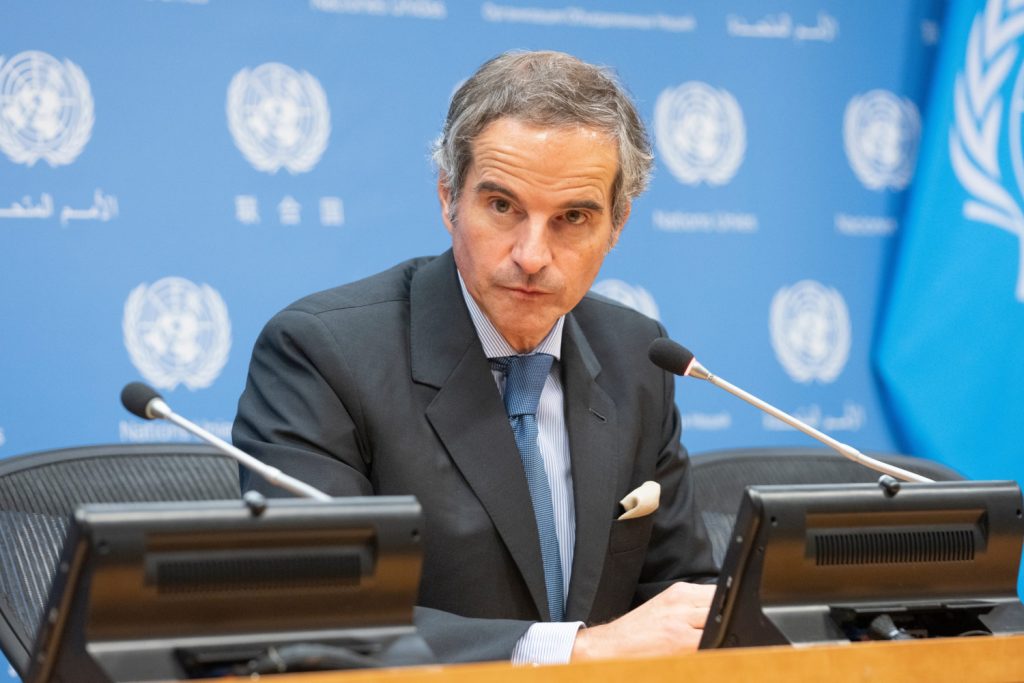Australia/Israel Review
Behind the News – April 2023
Mar 30, 2023 | AIJAC staff

ROCKET AND TERROR REPORT
One rocket was fired into Israel from Gaza on March 8.
A shooting attack killed Israeli brothers Hallel and Yagel Yaniv on Feb. 26 in Huwara in the West Bank. The terrorist responsible was killed by Israeli forces in a March 7 raid in Jenin that also saw five other Palestinian gunmen killed in the fighting. On Feb. 27, another shooting attack killed an Israeli-American near Jericho. On March 9, a member of Hamas shot and wounded three people in Tel Aviv before himself being killed. One victim subsequently died.
Multiple other shooting attacks have also occurred since the end of February as well as a number of attempted stabbings.
On March 13, an IED exploded at the Megiddo Junction, seriously injuring an Israeli Arab driver. Israeli security forces subsequently found and shot dead a heavily-armed suspect in a vehicle. He apparently infiltrated into Israel from Lebanon, and is believed to have been a Hamas member trained by Hezbollah.
HUWARA RAMPAGE SPARKS OUTRAGE
In the hours following the Palestinian terror attack in Huwara on Feb. 26, a group of some 400 Jewish extremists, incited and assembled through social media, violently rampaged through the town, torching a significant number of Palestinian homes, business, and vehicles.
The IDF and local Border Police units failed to arrive with sufficient manpower to confront the mob, though they did rescue nine families from burning homes. Palestinian authorities reported numerous injuries and one fatality among residents, although the circumstances surrounding the death were unclear.
Eight Jewish suspects were arrested after the attack. Israeli Defence Minister Yoav Gallant also placed two Jewish extremists under administrative detention.
Prime Minister Binyamin Netanyahu condemned the violence and admonished Israelis against “taking the law into their own hands.” However, Minister in the Defence Ministry Betzalel Smotrich called for Huwara “to be erased” before later backtracking.
SUMMITS OVER WEST BANK VIOLENCE
Senior officials from Jordan, Egypt, Israel, the Palestinian Authority (PA) and US met on Feb. 26 in Aqaba, Jordan for a regional security summit aimed at stemming the spiralling tensions between Israelis and Palestinians in the lead-up to the Muslim holy month of Ramadan. Israel and the PA agreed to temporarily hold off on “unilateral measures” opposed by the other side. One result was that the Palestinians withdrew a vote against Israel in the UN Security Council, while Israel reportedly committed not to advance plans for new settlement homes for four months or move to legalise West Bank outposts for six months.
A March 19 follow-up summit of the same parties at Sharm el-Sheikh issued a joint communique that included a commitment from both sides to establish a mechanism to reduce violence, incitement, and inflammatory statements. The parties also agreed to reconvene for more talks in April.
MORE ALLEGED ISRAELI AIRSTRIKES IN SYRIA
Recent strikes against targets in Syria allegedly included a March 8 drone strike on an Iran-backed weapons factory in eastern Syria in which seven people, at least three of whom were pro-Iranian militia members, were reportedly killed.
On March 12, a weapons store belonging to Iranian militias in the area between Hama and Tartous province was reportedly destroyed, with two people killed.
According to a March 17 broadcast on Iranian state TV, Iran is “likely” to sell surface-to-air missiles and radar to Syria to help beef up its air defences, presumably to try to stop such Israeli strikes.
IAEA: IRAN EDGING CLOSER TO THE BOMB
March 2023 reports on Iran from the International Atomic Energy Agency (IAEA) show that Teheran needs less than two weeks to produce enough highly enriched uranium for one atomic bomb warhead. The reports also indicate that Iran’s nuclear program remains almost free of IAEA supervision after Teheran removed monitoring equipment from its facilities two years ago.
However, Iran avoided condemnation at the IAEA Board of Governors meeting on March 6 to 10, following an agreement to restore the inspection equipment achieved during a snap visit to Teheran by IAEA Director General Emmanuel Grossi. Teheran also promised to finally cooperate with the IAEA’s years-long investigation into undeclared atomic sites and activity. A similar agreement with Iran made one year ago failed to produce any significant progress on monitoring.
Meanwhile, reports say that Moscow has decided to return enriched uranium to Iran that had been stored in Russia as part of the 2015 JCPOA nuclear deal.
IRAN AND SAUDI ARABIA RESTORE TIES
On March 10, Iran and Saudi Arabia signed an agreement to restore diplomatic relations that were cut off in 2016. The agreement, brokered by China, includes re-opening embassies and the development of economic and cultural ties. The deal is expected to lead to an end to the war in Yemen, where the Iranian-backed Houthi militia have been fighting a Saudi-led coalition since 2014.
Meanwhile, a few days before the agreement with Iran, it was reported that Riyadh gave the US a list of the preconditions it would require, including security guarantees and assistance in developing its own indigenous civilian nuclear program, before normalising ties with Israel.
IRAN CURRENCY CRATERING
Protests against the Government continue across the streets of Iran, with some hitting Teheran’s Grand Bazaar and the Alaeldin cell phone markets. The focus of these protests is Iran’s failing national currency, the rial, which nosedived to a new record low in March – one US dollar was traded for 52,650 rials. This translates into high inflation and soaring food prices across Iran, adding to existing major unrest since last September.
Meanwhile, there have been multiple reports of poisonings of schoolgirls, going back to November, affecting thousands of students at hundreds of schools across Iran. Symptoms included fainting, nausea, and shortness of breath, after having experienced “unpleasant” odours on school premises. Some students have been hospitalised, but there have been no fatalities. Iranian authorities have blamed opposition groups abroad, but analysts have suggested hardline regime elements could be responsible.
ISRAEL SEEKING TO EXPAND ABRAHAM ACCORDS
Israel is working to expand the Abraham Accords with Muslim-majority countries Mauritania, Somalia, Niger and Indonesia, according to Israeli reports.
Israel and Mauritania had diplomatic relations until Mauritania cut them in 2008, but Israel has never had diplomatic ties with the other three countries.
Israeli Foreign Minister Eli Cohen, who has been working on the normalisation with US officials, has hinted that negotiations with Mauritania are advanced.
Reports have also said Somali President Hassan Sheikh Mohamud is interested in establishing ties.
Israel and Indonesia have long had unofficial connections in trade, technology, and tourism.
ISRAEL-AUSTRALIA FLIGHTS TAKING OFF
Direct flights between Israel and Australia look closer than ever, after Victorian Minister for Industry and Innovation Ben Carroll and EL AL CEO Dina Ben Tal Ganancia signed a Letter of Intent on March 14 to work together to secure non-stop flights between Tel Aviv and Melbourne by June 2024. The Israeli national carrier is planning to operate three services per week.
This development was made possible by a decision by Oman, in late February, to open up its airspace to Israeli flights. Saudi Arabia decided to allow such flights last year.
Stranger than Fiction
Regime Revenge Porn
Just when you think Iran’s regime couldn’t sink any lower in its treatment of its own people, it proves it can. Not content with killing, torturing, imprisoning and beating dissenters of all ages who object to any aspect of its fundamentalist, misogynist, tyrannical rule, it has now taken to forcing schoolgirls to watch pornography. There are reports that schoolgirls from a number of schools where there had been chanting against the regime were subjected to this treatment in late 2022 and the first few months of this year.
And it’s not just any pornography. The mandatory video sessions include scenes of rape and of sex between people and animals. The purpose of these sessions is apparently to show the girls where the greater freedoms that many of them are bravely demonstrating for will supposedly lead. One parent reported that the school principal said they “wanted the girls to see the results of the sexual revolution,” while Hamid Rasaei, a hardline member of Iran’s parliament, said the protestors’ goal was “to sleep with someone every night and graze like animals.”
There are reports that some of the girls required medical care due to shock caused by the viewings, and that attendance numbers at some schools dropped sharply following these incidents.
Those showing the videos and enforcing the girls’ attendance are described as plain-clothed agents of the regime, believed to be from the Basij, the paramilitary arm of the powerful Islamic Revolutionary Guard Corps.
In some cases, parents have complained to education authorities, but rather than looking out for the girls’ welfare, authorities have instead threatened the parents with consequences, including denouncing them to the regime’s security services.
This latest warped tactic should be seen as an indication of how seriously the regime regards the threat of protesting schoolgirls.
Tags: Iran, Israel, Palestinians, Saudi Arabia, Syria






